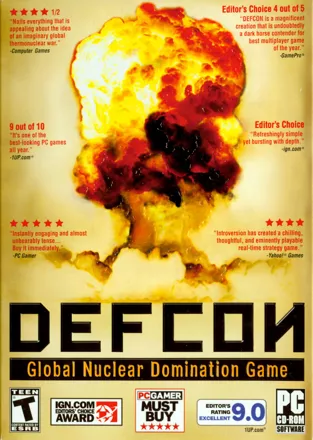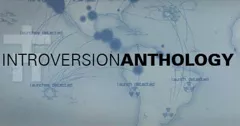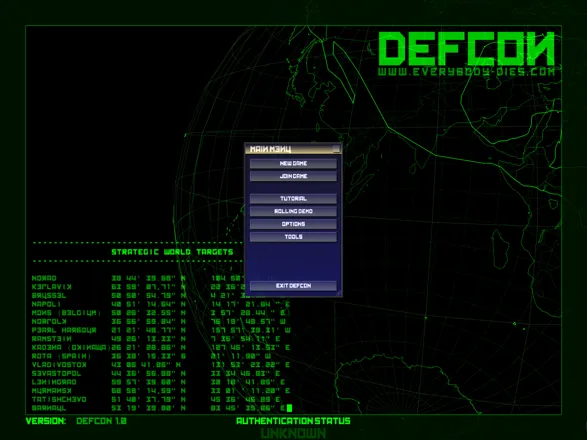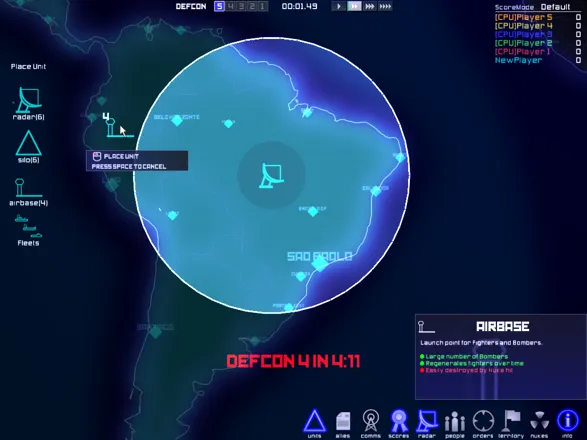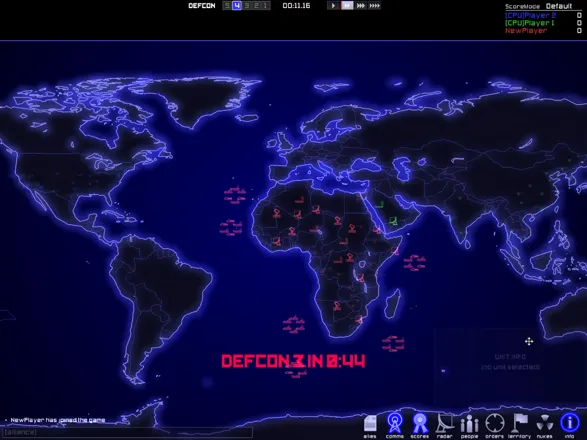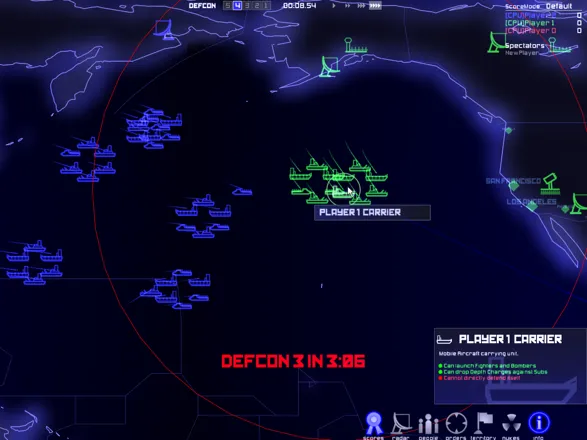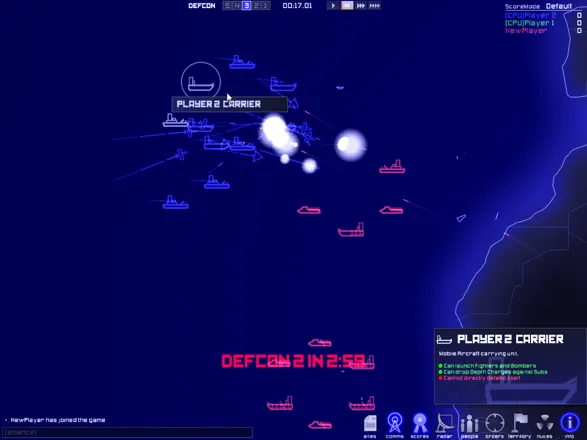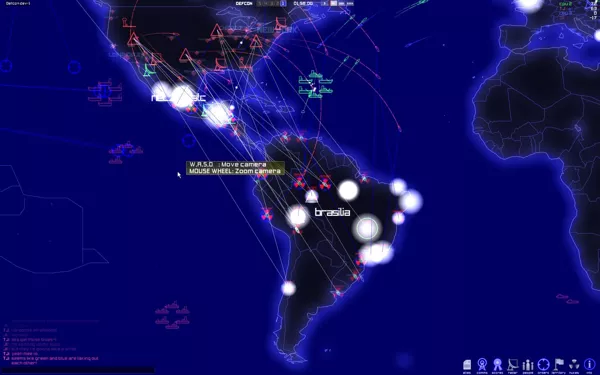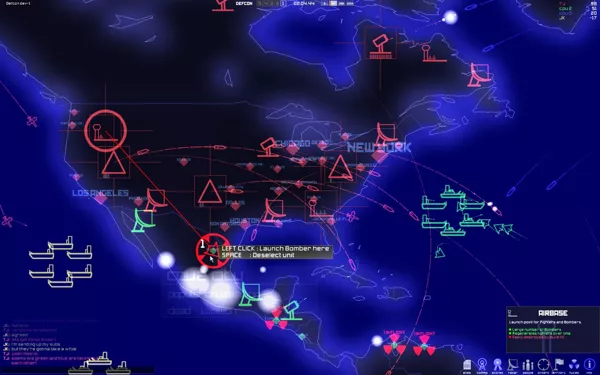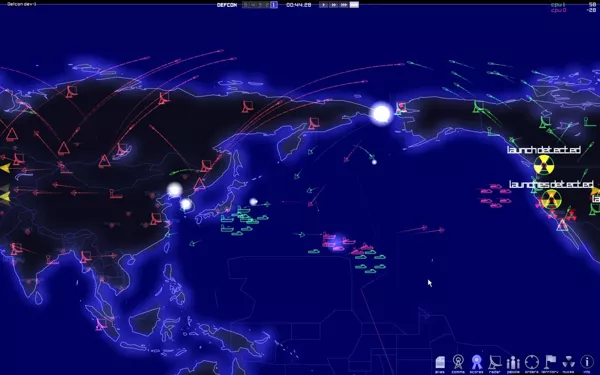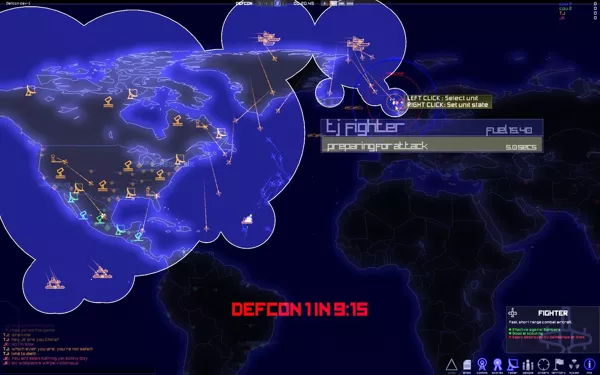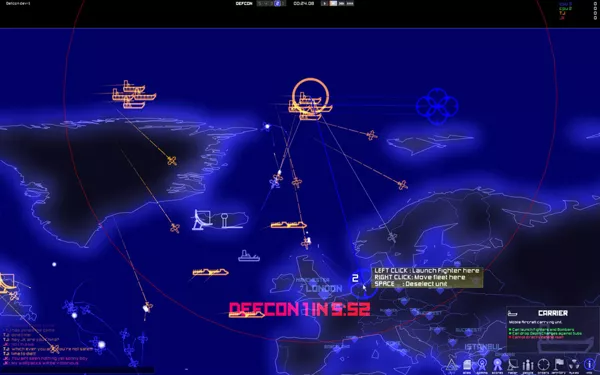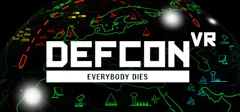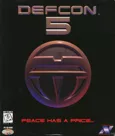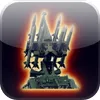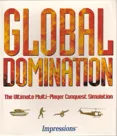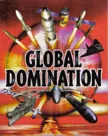DEFCON: Global Nuclear Domination Game
Description official description
The world is on the brink of Armageddon. A full-scale global thermonuclear war has broken out, and as a general in a bunker somewhere, you must direct your offensive and defensive systems to nuke your opponents. Nobody wins, but maybe you can lose the least. Everybody dies.
DEFCON is an online multiplayer strategy game, but it can also be played in a singleplayer mode. Players place units, such as missile silos, airbases and radar dishes, on their territorial maps, and the game counts down from DEFCON 5 to DEFCON 1, during which time the players are to make strategic choices to eliminate their opponents without losing too much themselves.
The gameplay is shown on a large world map and the action is represented by icons and lines reminiscent of the drawing style of their two previous games: Darwinia and Uplink.
Spellings
- DEFCOИ: Глобальная термоядерная война - Russian spelling
Groups +
Screenshots
Promos
Videos
Add Trailer or Gameplay Video +1 point
See any errors or missing info for this game?
You can submit a correction, contribute trivia, add to a game group, add a related site or alternate title.
Credits (Windows version)
74 People · View all
| Created by | |
| Produced by Introversion Software | |
| Sound Design | |
| Sound Production | |
| PR | |
| Marketing | |
| Additional Graphic Design |
|
| Shipping | |
| Beta Testers |
|
| [ full credits ] | |
Reviews
Critics
Average score: 81% (based on 42 ratings)
Players
Average score: 3.7 out of 5 (based on 30 ratings with 3 reviews)
The Good
Most classic war movies are actually categorized as "anti-war movies" in the media. Not because they avoid the subject of violence and destruction, but rather because they point the camera where it hurts, giving the viewer chills of terror as on-screen soldiers (and more importantly, civilians) relive real-world nightmares in all disgusting detail.
There are many games that deal with war, many of them I played. And so far, I had troubles pointing out a single one that tries to address the true atrocities of war. In Civilization, an atom bomb is a powerful but otherwise neutral resource, Command & Conquer has the emotional depth of a badly written comic book and most of today's WW2 themed games are either nothing but virtual hero worship or feature a plot involving telekinetic Nazi-zombies. And whenever that stupid reviewer guy from MTV interviews the executive producer he will proudly ASSURE you that the single most important purpose of his dramatic war game is... to be "fun".
DEFCON is different.
It is a cold game. Ice cold. It gives you chills. Numbers are running through the decorative background of the green-on-black retro vector graphics of the main menu. As your eyes wander over them, you realize, they are statistical data about survival rates in case of a nuclear holocaust and a detailed list of symptoms of radiation poisoning. Deep, menacing noises hum while a melancholic chorus sings a minimalist score in the background. Somebody coughs, unintelligible loudspeaker announcements echo in the distance.
All you see is a huge, blue screen filling your entire field of view. On it, in black outlines, the shape of the major continents of earth. Simple symbols represent missile silos, submarines... and all major metropolises. DEFCON 3. The first ships and airplanes start to move to strategic positions. DEFCON 2. Bombers launch, carrying nuclear SRBM closer to enemy territory. DEFCON 1. Dotted lines appear all over the map, each representing a nuclear missile headed for a major city. Panicky, the attacked try to intercept, but it is to late. A big, white glow spreads over the impact point. SVERDLOVSK HIT, 2.2 M DEAD. It will not be the last city to fall.
One death is a tragedy, a million is a statistic. You begin to crunch numbers, sort out the biggest targets and decide to sacrifice another vulnerable target at the eastern border. You make plans not to win, but to lose... less. And the concept sends a cold shiver down your spine.
The simplicity of DEFCON's graphics can easily hide the complexity of its gameplay. There are only a handful of units and building structures, but each is essential and covers one unique aspect of gameplay. Radars, Airbases and Missile Silos have to be placed strategically during DEFCON 4, to cover important parts of the region whose side you decide to play on (Africa, Europe, North America, Russia, South America and South Asia compete). Nuclear submarines are invisible to the enemy except for ships in active sonar mode (switching modes takes precious time and should not be done thoughtlessly). Carriers can launch bombers and fighter planes closer to enemy borders. Fighters can intercept ICBMs in mid-air but can also be used to attack enemy units or scout territory for key targets such as missile silos or radars. When damaged, they can be repaired at airbases, but not on carriers. Having a well-distributed radar network is essential to catch enemy units before they can reach critical targets. Each move takes time, each unit is essential. Diplomacy lets you form alliances - if you are not betrayed in the last minute. Speed can be chosen between 1x (real time) up to 20x. It's an RTS with the graphics of a futuristic chess game and the atmosphere of a busy command center in the White House nuclear bunker.
Although the game features a solid AI, it is a multiplayer game at heart. Games of different sizes, settings and modes can be played with others on the internet. A maximum game speed can be chosen by the players and a solid lobby system for each match makes finding or opening a new one quite comfortable. The nicknames and conversations are shaped by the game's atmosphere. Chat partners with names of forgotten war lords or peace activists make sarcastic jokes as Europe is wiped off the map and new alliances are formed.
There is something dark, cynical and menacing about DEFCON that is pretty much unlike any game I have ever played before. The gloomy graphics and atmosphere, inspired by movies such as Wargames or Dr Strangelove, work on so many different levels, it's a truly outstanding experience. Never before plain numbers and statistics had such an emotional impact on me when playing a game. I remember the first time I saw the virtual version of my home city being hit by an ICBM and... I cried. Yes, I CRIED while playing an RTS game and I don't even feel ashamed.
The Bad
There are more complex, more accessible games that might provide deeper game mechanics on the long run. Civilization might be more fun in this regard. But you could argue that this is not what DEFCON is about after all.
The Bottom Line
DEFCON might be the only war game ever made that doesn't slobber over technical details, shallow heroism or spectacular action sequences. It is the rarest of exceptions in our young, naive and action-packed medium of computer gaming: A game that is grown up, in every possible sense of the word.
Windows · by Lumpi (189) · 2009
A so-so game that makes you feel like a horrible person
The Good
The packaging is good, for what it's worth. I enjoyed getting the game for Christmas, and reading the manual. It's also pretty much bug free as far as I can see. Of course, if I had more to say good about it, I wouldn't have played it for a half hour before uninstalling it and putting it away.
The Bad
Do you remember the mission in Call of Duty: Modern Warfare 2, “No Russian”, where you could, if you wanted to, gun down dozens of helpless civilians? If the virtue of a person were measured by how many helpless, innocent civilians he or she murders in games, a person who launched a single nuclear missile at a city in DEFCON would be 10,000 times worse than a person who gleefully shoots up the airport in “No Russian”. But that alone isn't what makes the game not enjoyable to play. You can nuke cities in Cornutopia's games Thermonuclear Domination and Radioactive, as well as the Civilization and Alpha Centauri series, and the Space Empire series allows you to kill hundreds of millions of people from orbit. The difference is that in all those games, there can be an ulterior motive for killing so many. In Thermonuclear Domination and Radioactive, a lucky strike on a city can win the game by destroying the enemy headquarters. In the other three series I mentioned, they can be used to destroy military forces and means of production. In DEFCON, you use nuclear weapons on cities for no reason but simple points.
That's the main reason it's not enjoyable, but it's also not, by and large, an accurate game. Nuclear weapons can't be used against formations of ships. ICBMs take exactly three hits by any other nuclear weapon to destroy. There's no difference between different yields - no tactical cruise missiles, no midrange SLBM or ICMBs, and no high-yield gravity bombs. There's no differentiation between what hits what, and what effects it has on it. Also, for no particular reason I can think of, the missile silos double as Anti-Ballistic Missile installations. While that alone makes no sense that both would be in the same location, it makes even less sense that there's a long delay between switching between them, like it's the Battle of Midway and I need technicians to remove one kind of weapon and attach another partway through the battle. Aren't there enough silos for everybody? Plus, in addition for there being no reason to hit cities aside from points, there aren’t any land military targets aside from radar dishes, airfields, and silos. If you're going to give the player points for destroying things, why not points for destroying Army bases? That would at least make a little more sense than points for destroying cities for no reason save points. And finally, as a minor gripe, it seems pretty much all the aircraft pilots are suicidal by nature. Rather than automatically turning back, or giving the player the option to have them automatically turn back when they reach half a tank of fuel, they won't turn back unless ordered. This leads to many, many cases of jets and bombers running out of fuel and crashing 50 miles from airbases and ships.
The Bottom Line
After I played Thermonuclear Domination and Radiation, and enjoyed those, I read the review in the magazine PC Gamer for DEFCON, and it sound like just a more advanced version of those games. So, I asked for it for Christmas, and got it. I found, to my dismay, that it was only fun for a few minutes. I started it up, updated it, and began the tutorial. There was no catchy tune in the game, only depressing, sleepy, boring, and sad music, which actually includes sniffling and crying as background sound effects. Further, as I started playing the tutorial, I started to see more and more things that were just game features by fiat of the developers. It's a game that starts in reality, but isn't a realistic depiction of how nuclear war would play out. Then I got to the final Tutorial mission. After destroying enemy defenses, the game asked me to nuke the enemy cities and “rack up some Megadeaths”. I did, but the first nuclear bomb only destroyed half the population of a city of 6 million. So, I nuked it again, and a few more times. Each time, the number decreased, but less and less each time, like I was either shooting cities with a Davy Crockett recoilless gun, or the survivors had turned into Supermen and could no longer be hurt by nuclear bombs. Then I realized I was killing hundreds of thousands of people in the game that offered no threat to me, just because the game asked me to. I felt like a monster, uninstalled the game, and put it away.
Don't buy this game. Whatever your misconceptions of what this came is about, know three things. First, it’s not a realistic game. Second, it's not very fun. Third, if you’ve read about it and read reviews, and are thinking of buying it because it's a game protesting a social ill, know that buying a game for such reason makes you a culture jammer or a hipster, and that that's a terrible reason to purchase anything. If that's your reason for thinking about buying this game, go watch the movie When the Wind Blows. That will show the horrors of nuclear war without asking you to be the one to push the button.
Windows · by kvn8907 (173) · 2012
So damned dark, its hard to take it seriously.
The Good
Gameplay wise, the strategy aspect is mostly a game of macro-scale tactics (given there is no way to replace ships one loses). I don't often play multiplayer and so, of the time I remember playing it, the only noticeable difference the game made was asking all participants whether to agree to an increase in speed (almost necessary if you are playing alone with no friends you hate) and the chat function (which I care little for; I play with strangers and I don't want them to hurl crap at me when I am hurling missiles at them). Despite the seemingly simple game design, the game does becomes uncharacteristically fast-paced at the slowest phase, when missiles launched at your cities move slowly and you feel powerless as missile defence takes it own sweet time to put it out and the increased time the game gives feels like an illusion to base your thoughts of victory on. Its best moments are when it fools the player into believing that he has the time and control over factors he really does not.
But it is the humour that makes this game important- evil, black and scary. The main screen is a vector graphics representation of the world, reminiscent of the computer systems used by the US in the 1980s. This suits the game perfectly, because this gives the player a glimpse into the mindset of people who literally had an entire world full of living, feeling, caring creatures they needed to ignore when the decision one needed to make was whether, in a war where a button may seal their own fate and that of their opponents, they could be content with simply winning the war or ensure that their enemy loses utterly. If it weren't obvious for the simple "2 million dead" that hovers over Tokyo after being hit a third time, the decision the developers wanted you to make was the latter. You attack first or you lose.
The Bad
Story- possibilities. No, I don't mean the game does not have a story but that this game can't provide the player with an individual story to tell. How different a game experience are you going to have when, other than a shift in positioning of your Defence systems, there is no separation in the power blocs' capacities? Having leveled the playing field, the game makes its biggest mistake by going too far with detaching itself from humanity. Your memories of any game, whether you won it or lost it, will not matter to you, because the vessel, the aircraft, the cities do not have a trace of humanity in them and you just can't tell a good story where the protagonists are toys.
The Bottom Line
Defcon is important in the same way that Lord of the Flies is- to illustrate man's inherent capacity to use violence as a motivator. In Lord of the Flies, the violence heralds the loss of childhood innocence; in Defcon, the violence clarifies that there was no innocence to be lost in the first place.
Windows · by Victor Joseph (9) · 2014
Discussion
| Subject | By | Date |
|---|---|---|
| When the Bomb Goes Off | Lumpi (189) | May 7, 2009 |
Trivia
1001 Video Games
DEFCON appears in the book 1001 Video Games You Must Play Before You Die by General Editor Tony Mott.
Inspiration
DEFCON is probably inspired by Wargames more than anything else (the movie and it's videogame adaptation). The game's look as well as text on the main menu are direct references to this.
Sound
DEFCON applies a bunch of casual sounds to heighten the psychological effect of dealing with a thermonuclear war. Among these, the background music stays very much in the background. However as the game approaches the Defcon 1 stage, the background music increases in both tempo and strength. During actual nuclear war, piano key strikes can be heard as nuclear warheads impact with cities.
Awards
- Games for Windows Magazine
- March 2007 - #6 Game of the Year
Analytics
Related Sites +
-
How We Learned to Stop Worrying
An Apple Games article about the Mac version of DEFCON (April, 2007).
Identifiers +
Contribute
Are you familiar with this game? Help document and preserve this entry in video game history! If your contribution is approved, you will earn points and be credited as a contributor.
Contributors to this Entry
Game added by optrirominiluikus.
Macintosh added by Kabushi. Linux added by Iggi.
Additional contributors: Andy Voss, destruent, Jeanne, Corn Popper, Atom Ant, Sicarius, Zeppin, Patrick Bregger, Plok, FatherJack, st2wok, Zhuzha.
Game added October 10, 2006. Last modified December 23, 2024.


